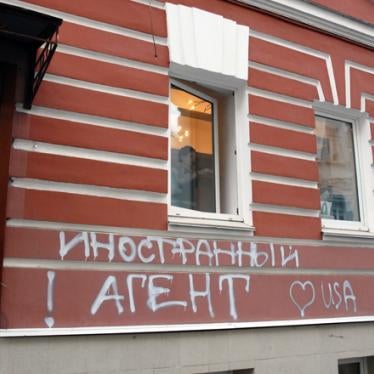(Moscow) – We had been anticipating the inspection for a while. Such is the atmosphere in today’s Russia that many nongovernmental organizations can expect the knock at the door at some point. When they finally came to us, however, the visit was tinged with farce as well as stress.
We were not yet in the office when they rang the bell that late March morning. Clearly, Russia’s tax inspectors, prosecutors, and Justice Ministry officials are early risers.
A fewphone calls brought us there quickly, though, to let them into our workplace, where they spent the next four or five hours rummaging through our documents. They went over our registration papers, including our work plans, leadership lists, travel schedules, and dozens of other documents, copies of which we have regularly filed with the authorities. They took a bunch of our reports, somewhat incredulous that we display them openly for any visitor to see -- and were even more surprised when we told them that they couldalso be found on our website.
This is how it is in today’s Russia, one year since Vladimir Putin returned to the presidency. Over the last twelve months, the authorities have introduced a sweeping set of restrictive new laws. In addition to raids on nongovernmental groups, they are harassing, intimidating and imprisoning political activists. Government critics and even charities that can in no way be thought of as political are cast by the state and by obedient media outlets as clandestine enemies.
So we weren’t surprised by their visit. After asking for the other documents, finally they asked for the official document that registers our office address. Obviously, this last one had confused someone somewhere, because midway through the raid, our previous landlord had telephoned nervously to say that a news crew from Russia’s NTV was outside our old office wondering where the action was.
Perhaps they’d been tipped off by the authorities as they had been with other inspections. The government has been using compliant media, especially television, to vilify civil society, during this wave of repression. Or perhaps the station learned about the raid from Twitter.
Either way, they ended up at the wrong location, and by the time they finally got to the right one, the inspectors were having a lunch break, so the filming opportunities proved to be somewhat limited.
When the officials returned from lunch, they photocopied dozens of documents (never hesitating to use our paper supplies and copy machine), stuffed them all into a cardboard box and left us, presumably returning to the offices where records of all these documents already existed.
To be fair, they were not belligerent or menacing, but everyone in the room knew why they were there. This was another of the invasive inspections that Russian authorities are using in their expanding crackdown on civil society. The state has done hundreds of these, hitting foreign and domestic organizations alike, from human rights groups like ours, to environmental activists, to groups assisting people with disabilities. No one seems immune.
Several weeks after the inspectors’ visit to our office, we received a summons to the prosecutor’s office. They wanted to question us as part of the still unfinished inspection. So we photocopied yet more papers and spent another three hours answering questions, just as many other colleagues from Russian and international groups have, in Moscow and in the provinces alike.
Compared with the experiences ofsome nongovernmental organizations, our inspection didn’t seem that bad -- mild harassment. The inspectors did not remove or try to use any of our computers, as they did at other offices. They did not ask our staff for chest X-rays and immunization records, alleging that we could be spreading infectious diseases. Nor did they demand to see office air-quality and noise-level certificates, as they did elsewhere. One organization even had to photocopy over 8,000 pages of documents as part of their inspection. That’s ten times the length of War and Peace.
Domestic groups have it much harder than international ones like ours. If they receive foreign funding and engage in advocacy work– which the government views as “political activity,” the authorities want them to brand themselves as “foreign agents,” words that sound like a confession of espionage. Their refusal to do so has led to warnings, court hearings, and fines for over 30 groups already.
The state claims the inspections are “routine,” but they only started recently, at the same time as other measures aiming to marginalize civil society. Quite simply, this is a state campaign to curtail or shut down independent activity -- and it is unprecedented in the last 20 years.
As they left our premises a month ago, the inspectors, somewhat bizarrely, criticized our office building as being too “Soviet-looking.” That term better applies to the inspections and the accompanying anti-foreign hysteria. This irony, however, seemed to be lost on our guests.






